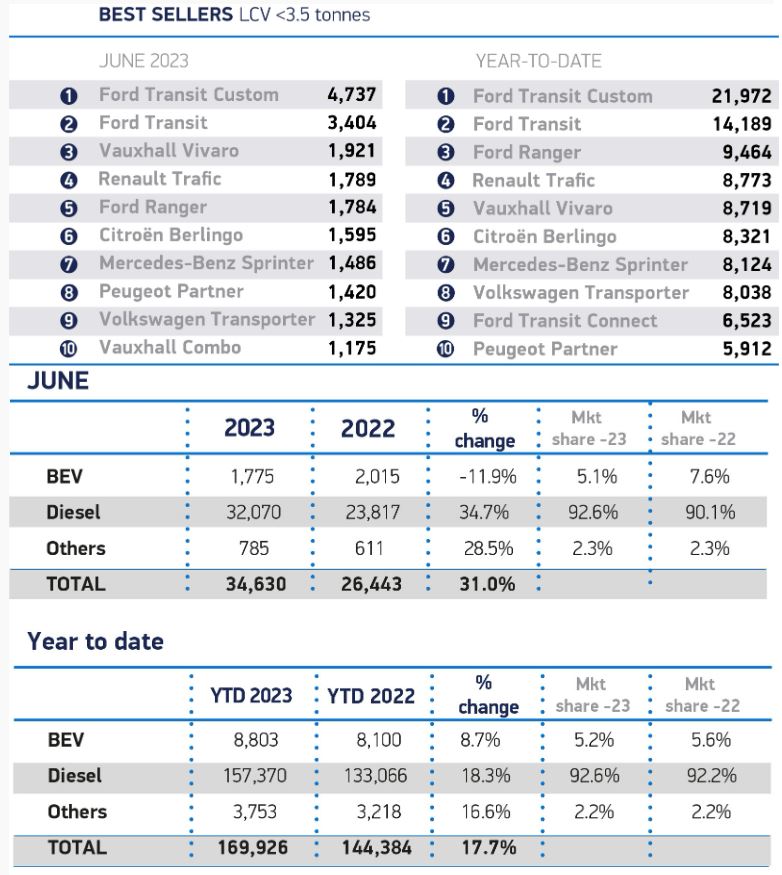
[ad_1]
The UK’s LCV market grew by 31.0% in June, with 34,630 models registered, the most effective efficiency since 2019, as provide chain shortages eased and bigger vans dominated gross sales.
Based on the newest figures launched by the Society of Motor Producers and Merchants (SMMT), the UK’s new mild business car (LCV) market has skilled its sixth consecutive month of progress, with registrations rising by 31.0% to achieve 34,630 models in June.
This represents the strongest June efficiency since 2019.
Within the first half of 2023, a complete of 169,926 new vans, pickups, and 4x4s have been registered, marking a 17.7% improve in comparison with the identical interval final 12 months. These constructive traits will be attributed to the easing of persistent provide chain shortages, the commerce affiliation says.
 The registrations of bigger LCVs, weighing between 2.5 and three.5 tonnes, grew by 15.6% to achieve 23,640 models in June, accounting for 68.3% of the market. Medium-sized vans weighing between 2.0 and a pair of.5 tonnes additionally noticed a big improve of 160.8% with 6,291 models registered.
The registrations of bigger LCVs, weighing between 2.5 and three.5 tonnes, grew by 15.6% to achieve 23,640 models in June, accounting for 68.3% of the market. Medium-sized vans weighing between 2.0 and a pair of.5 tonnes additionally noticed a big improve of 160.8% with 6,291 models registered.
Nevertheless, the section of lighter vans weighing lower than or equal to 2.0 tonnes skilled a decline of -42.8%. This explicit section has constantly witnessed a lower in demand as operators go for bigger automobiles that provide higher price efficiencies. Then again, pickups and 4x4s had substantial progress, with registrations rising by 40.8% and 180.1% respectively.
Regardless of the general progress within the LCV market, there was a -11.9% decline in demand for battery electrical vans (BEVs) in June, reaching just one,775 models, which the SMMT described as “regarding” given the rising availability of BEV fashions.
This brings the full variety of electrical vans registered this 12 months to eight,803 models, representing a year-on-year improve of 703 however a decline in market share to five.2% for the 12 months to this point.
Mike Hawes, SMMT chief government, mentioned that is worrisome contemplating the upcoming zero emission car mandate, which might be carried out in simply six months’ time. Pressing motion is required to speed up the adoption of electrical vans, particularly since business automobiles play a significant position in holding Britain shifting.
Hawes mentioned: “As we attain the 12 months’s halfway mark, the surge in mild business car registrations is sweet information and delivers continued optimism to the market. The autumn in electrical van uptake simply on the time once we want it to develop is, nevertheless, very regarding.
“Regardless of the continued availability of the plug-in van grant, extra must be finished to provide operators the arrogance to make the swap. This implies a long-term plan which helps buy and helps overcome among the boundaries to the set up of van-suitable charging infrastructure, given the distinctive wants of this sector.”
Sue Robinson, chief government of the Nationwide Franchised Sellers Affiliation, added: “The value parity between battery electrical vans and diesel engines is much too extensive, just like the brand new automobile sector, which is negatively affecting the uptake of electrical within the run as much as 2030. This, coupled with a patchy and lacklustre charging community throughout the UK, is diverting van operators away from making their swap to electrical”
“Authorities should act on the entrance foot by making extra strategic choices and imposing monetary incentives to assist the uptake of electrical on this market.
“Because the business’s solely commerce physique for automotive retailers, we’ll proceed to foyer Authorities to find out the absolute best consequence for our retailer members, guarantee their voice is heard and promote inexperienced, clear transport for commercials.”
[ad_2]